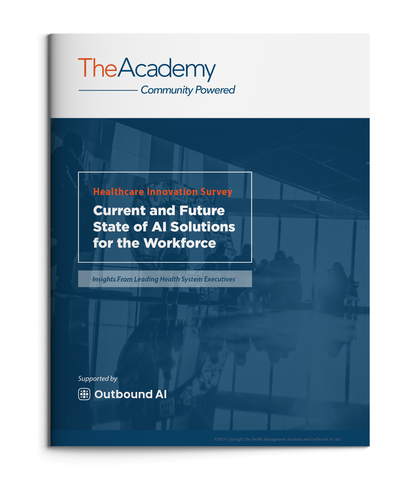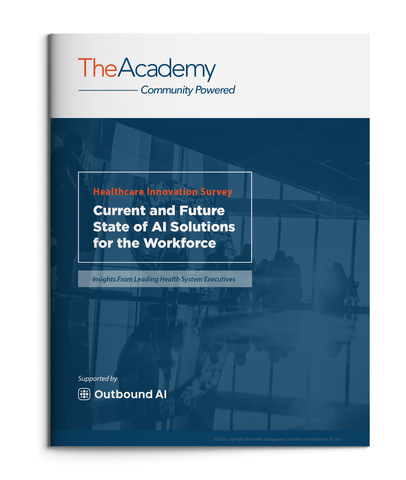SEATTLE--(BUSINESS WIRE)--Given the severity of labor shortages and staffing constraints facing health systems nationwide, C-suite executives are turning to artificial intelligence (AI) to fill gaps and improve productivity, according to a recent survey conducted by The Health Management Academy (The Academy) with support from Outbound AI. Almost half of executives (47.5%) report their health system is currently using AI solutions for the workforce, while all others (52.5%) report their health system is currently evaluating or considering AI solutions for the workforce.
Back Office is Focus of AI Adoption To Date
Survey findings indicate that the typical progression of AI investments is: (1) back office, (2) clinical operations, and (3) clinical care. Back office most often includes revenue cycle, human resources and/or supply chain management, areas proven to result in "quick financial wins through cost savings." More than three-quarters (78.0%) of executives report their health system is currently using or evaluating AI for revenue cycle management.
Nursing is Key Target for AI Among Clinical Workforce
Additional survey data show that although only 15.0% of executives report their health system is currently using AI for nursing, an overwhelming 82.5% report their health system is currently evaluating or considering AI for nursing. As one executive notes: "We are prioritizing where we can impact the biggest labor pain points. This is mostly in nursing."
Near-Term Investments in AI for the Workforce Expected to Increase
The industry will likely see an acceleration of investments in AI solutions for the workforce. Among executives who report their health system is currently using AI solutions for the workforce, 84.5% expect a moderate to significant increase in the next one to three years.
Growing Interest in Conversational AI Solutions
When asked whether their health system uses conversational AI, most executives answer, “yes, we have chatbots.” While chatbots have gained traction, it is important to acknowledge they are only one of many use cases for conversational AI. Despite this knowledge gap, over one-quarter of executives (27.5%) report their health system is currently using conversational AI solutions, while all others (72.5%) report their health system is currently evaluating or considering conversational AI solutions.
Executives Scope Multiple Sources to Evaluate AI
Though opportunities to leverage existing technologies and partnerships are prioritized, executives are receptive to forming new relationships. The survey indicates that executives focus on real-world case studies and return-on-investment (ROI) data. They also seek recommendations from their peers. The five most important factors executives evaluate are:
- Interoperability with EHR
- Privacy and security
- Ability to augment EHR capabilities
- Anticipated return on investment
- Expected value (hard and soft) across 3+ years
Survey Methodology and Background
Executives selected to participate in the survey were verified as having a high degree of familiarity with strategic decisions surrounding AI solutions at their respective health systems, as recognized by an average score of 9.35 on a 10-point scale, wherein 10 denotes “very familiar.” The Academy used both quantitative and qualitative methods to capture insights and perspectives from a total of 40 executives at 40 leading heath systems spanning multiple geographic regions, sizes (measured by net patient revenue) and academic medical center status. Titles included Chief Information Officer, Chief Medical Information Officer, Chief Financial Officer, Chief Technology Officer, Chief Transformation Officer, and Chief Digital Officer, among others. The Academy received financial support from Outbound AI, a Seattle-based solution provider specializing in Conversation AI built for healthcare.
About The Health Management Academy
The Health Management Academy (The Academy) powers our community to drive health forward. Our community is made up of healthcare’s most influential changemakers, including executives from the top 150 U.S. health systems and the most innovative industry partners. We power our members by building our community and fostering connections through executive peer learning. We support professional growth through talent and development. We accelerate understanding by delivering timely and actionable data and insights on key challenges. And we catalyze transformation by building alliances in areas where the power of the collective is greater than the power of one. More information is available at www.hmacademy.com.
About Outbound AI
Outbound AI is Conversation AI built for healthcare. Founded in 2021, the Madrona Venture Labs spinout is breaking new ground with cloud technologies that streamline phone-based administrative work across a wide range of revenue cycle applications. Its AI-first solutions serve as workforce multipliers that drive productivity while improving the daily job experience for human talent. The company’s inaugural offering, PayerVA Console, includes a portfolio of intelligent virtual agents and out-of-the-box automations for claims processing. Outbound AI is led by a passionate team of health and voice tech veterans and backed by several preeminent venture capital firms renowned for success with emerging AI and cloud technologies. More information is available at www.outbound.ai.




